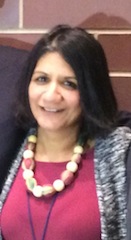In preparation for The Allied Genetics Conference (TAGC), set to take place in Orlando this July, Genes to Genomes is getting the inside scoop from many of the outstanding keynote speakers in our “Behind the Podium” series. In the first of a series of interviews, GSA graduate member Elisabeth Bauerly catches up with Drosophila researcher Amita Sehgal, who is known for her studies on sleep and circadian rhythms.
____________________________________________________________________________

Amita Sehgal
John Herr Musser Professor of Neuroscience
HHMI/University of Pennsylvania
Elisabeth: Thanks for taking the time to speak with me, Dr. Sehgal. As an early-career geneticist, I can’t wait for TAGC. Are you as excited as I am?
Amita: Of Course! Sometimes we geneticists become isolated by organism even though we are working with questions and tools that are the same across species. I think we could all benefit greatly by sharing our knowledge at TAGC.
Elisabeth: Have you decided what you’ll focus on for your keynote address?
Amita: I’m still working on the specifics, but I can say that I will discuss the genetics of behavior and its relationship to circuits.
Elisabeth: That sounds interesting. I’m curious, how did you get into this line of research?
Amita: Well, in graduate school I worked on human neural growth factors and I knew I wanted to get into genetics. I learned quickly that working with human cells has limitations and switched to the fruit fly model. I grew fascinated with the circadian clock and the likelihood that there were more genes for biological rhythms. At the time, only one gene had been linked to rhythm in 20 years!
Elisabeth: Your fascination has obviously become a passion. What do you find most rewarding about your science?
Amita: I love having the ability to peruse the unknown and figure out a problem. Major results are few and far between, but so worth all the efforts that go into them.
Elisabeth: Many of our readers are undergraduates, graduate students, and postdocs. What advice could you give them about pursuing a scientific career?
Amita: They should ignore the old view that science is a field of isolation. To have a great scientific career, you need to be interactive with your colleagues.
Elisabeth: You first joined the GSA almost 20 years ago. Why do you think societies like GSA are important?
Amita: Genetics is not just one organism. The work of GSA ensures that the science of all model organisms is represented in balanced way.
Elisabeth: At G2G we try to remind people not to spend all of their time in the lab, so what do you do for fun?
Amita: I am very social! I enjoy traveling and I love to read, on my own and as part of a book club.
Elisabeth Bauerly is a graduate student at the Stowers Institute for Medical Research. Using both the latest CRISPR techniques and power of Drosophila genetics, she is focused on elucidating mechanisms underlying epithelial homeostasis.













